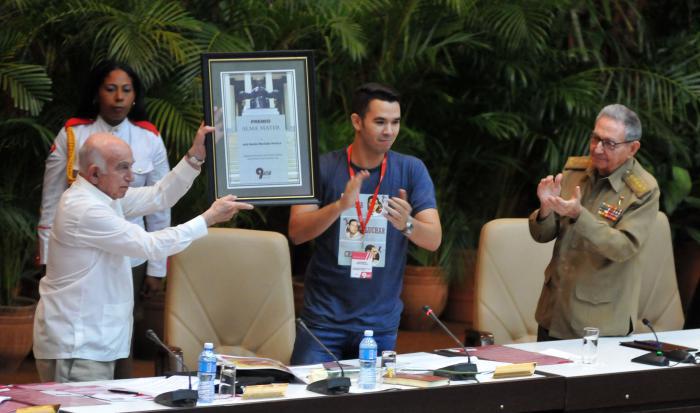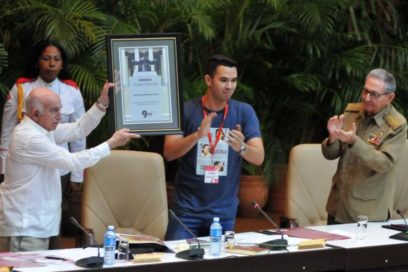
As a demonstration of Cuban university students’ commitment to the Revolution’s historic generation, the Federation of University Students (FEU) presented the organization’s highest award, the Alma Mater, to Army General Raúl Castro Ruz, first secretary of the Communist Party of Cuban Central Committee, and José Ramón Machado Ventura, Party second secretary.
The two leaders, as well as the President of the Councils of State and Ministers, Miguel Díaz-Canel Bermúdez, attended as guests of honor the final session of the FEU’s Ninth Congress, which has held in Havana’s International Conference Center, on the 63rd anniversary of Fidel’s exile in Mexico.
FEU national president, Raúl Alejandro Palmero, presented the award to José Ramón Machado Ventura, highlighting his “consistent anti-imperialism – evident since his days as a medical student – his modesty, candor, and sacrifice over the years, his affection for youth and his example,” saying that all of this made Machado more than worthy of the honor.
With the same affection, Palmero presented the Alma Mater Award to Army General Raúl Castro Ruz, “one the most loved members of the FEU,” for his record of struggle as a university student, and “for having given us the example, the inspiration, to become the hotbed we are today in defense of socialism, for his mettle, courage, and serenity.”
The FEU president noted other motivations for the award, emphasizing Raúl’s “unwavering conviction that we can triumph in the most difficult moments,” describing him as “a guide and paradigm for new generations who never lost his smile or youthful spirit,” while noting his “modesty, disinterest, altruism, confidence in and love of youth… and above all for being the most Fidelista of all Cubans.”
José Ramón Machado Ventura thanked the delegates for the distinction, saying it was unexpected, but “accepted with heartfelt gratitude.”
Listening to you, he said, representatives of a quarter million students in the country, I see how different the times are now from those when I was one among only 15,000 university students in all of Cuba. With the triumph of the Revolution, for the first time, youth were taken into account, he said while adding that he would dare to say that in very few places do students gather with full support to reflect and seek solutions, from the grassroots level to the national.
Machado added that the more than 10,000 proposals made during the pre-Congress discussion are a source of pride, given the seriousness, responsibility, and commitment they reflect.
It could be no other way, he said, since this Revolution that began October 10, 1868, has always been led by young patriots, followers of Martí, just like those present here today, Machado said, noting that this generation, the continuators of the struggle, have shown the relevance Fidel and are loyal to his ideas, the very essence of the FEU.
He recognized the multiple projects enthusiastically undertaken by the organization, which have an impact beyond the university’s walls, as is the case of the “Educating with love” effort.
Machado concluded saying that, just days before celebrations of the 65th anniversary of the assaults on the Moncada and Carlos Manuel de Céspedes Garrisons, July 26, we are proud of the students we have, of their capacity to be useful, and the anti-imperialist spirit they maintain.
TRIBUTE TO FIDEL
Attending the gathering of Cuban university students, held in Havana July 6-8, were 500 delegates and guest representing all the country’s provinces. On the final day of the event, Fidel and his close relationship with youth were recalled.
His words during the FEU’s First Congress in 1979 were remembered: “May each one of you make the commitment to aspire to the standard set by Julio Antonio Mella in revolutionary spirit, in work, in effort, in your studies,” said Fidel, “I have the profound conviction that in each one of you lies a Mella, a José Antonio… They and many like them fell as seeds to become trees, as Mella wanted: to be useful serving as a banner. And you, university students of today, are the fruit of that tree, the bearers of that banner.”
FEU President Raúl Alejandro Palmero insisted that the greatness of Fidel and José Martí guide us at this time, and that the FEU is taking on the challenge of providing continuity to their legacies, as befits this people and our history.
The student leader described the debate that occurred during the Congress, as “enriching,” with reflections focused on the brigade, the basic grassroots unit of the organization, which must promote “unity and debate in every university classroom.” He emphasized the need to continue encouraging study; supporting graduates; expanding social projects with impact in communities; promoting the amateur artists’ movement; as well as making communication an important tool in the struggle.
Our reality is far removed from that lived in Cuba before the triumph of the Revolution, Palmero noted, saying that we don’t experience the social or racial inequalities of a time when youth had no part in political decision-making, when the educational system was in crisis and only responded to the interests of corrupt governments.
“Thus today we honor the memory of the young lives lost; we honor José Antonio Echeverría leading the Federación Estudiantil; Julio Antonio Mella; the young Fidel. All, the heroes and martyrs of the student movement are a source of pride and accompany this organization today as their centenary draws close.”
Raima González, delegade from the province of Pinar del Río, described the Congress as a gift to Fidel from students, emphasizing, “We are not an apolitical youth,” as was made evident by the many responses and solutions to problems proposed by the grassroots membership and discussed during the event.
“We haven’t forgotten history, or renounced our principles or ideas. We are proud to be Cuban, following Fidel and Martí,” she added.
For his part, Ismael, a medical student from Nigeria, said he was African by birth, but Cuban in his heart, explaining, “I became a man here. Thanks to this Revolution that is so grand. I come from a continent where many countries are poor, where children die of hunger and have no access to education or health care. Many believe they live free, without ever knowing freedom or peace. Take care of this Cuba, truly free and independent. The children of the world are here to defend it to our last breath.”
During the final day of the Congress, the election of the Federation’s new leadership was announced. Chosen to continue as president was Raúl Alejandro Palmero, also a member of Cuba’s Council of State.
Additionally elected to the National Secretariat were José Ángel Fernández Castañeda, as vice president, and Mirthia Julia Brossard, president of the Continental Organization of Latin American and Caribbean Students.
Concluding the day, delegates approved a Final Declaration, reaffirming Cuba’s socialist nature and the continuity of the Revolution, anti-imperialist and true to the legacies of Martí, Fidel, Marx, and Lenin, as this generation’s principal mission.
Also participating in the closure of the Congress, were Susely Morfa González, Council of State member and first secretary of the Young Communists League (UJC), as well special guests from the Party Central Committee, the UJC National Bureau, and government. (Taken from en.granma.cu)


